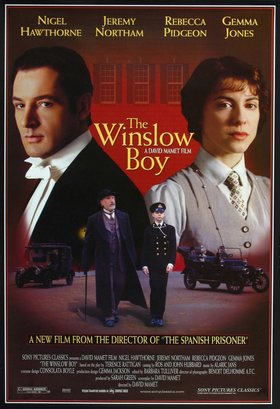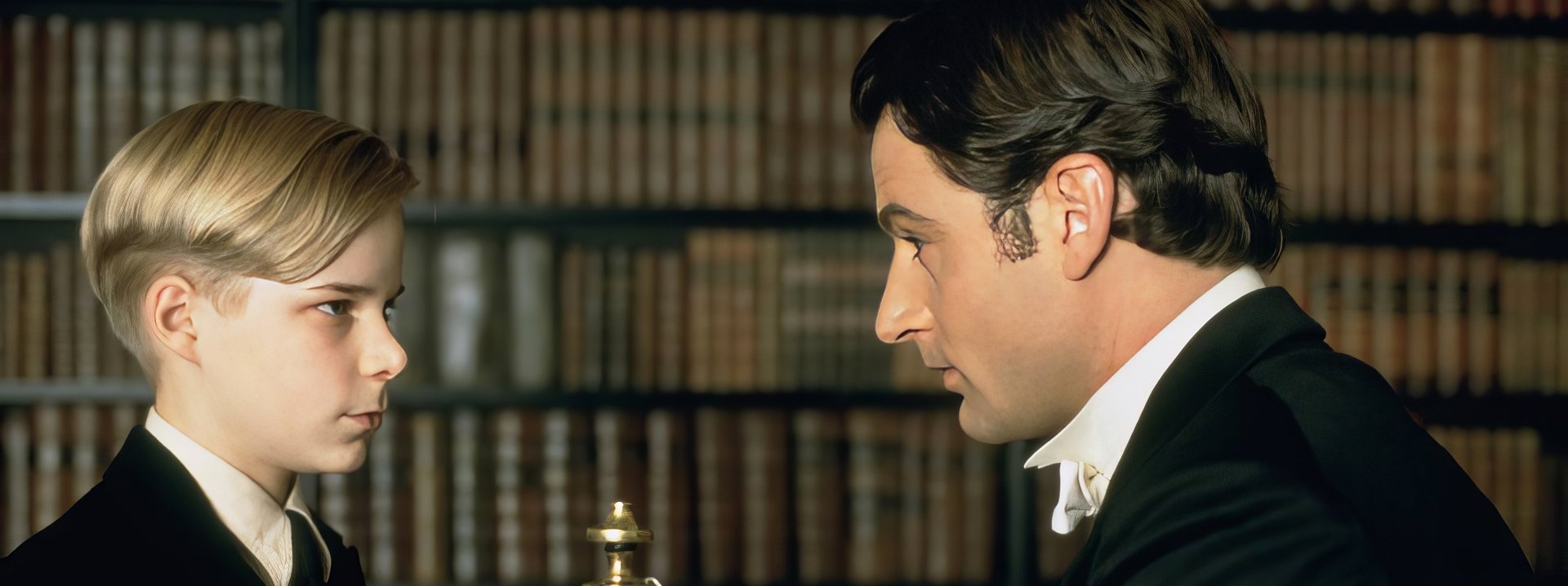The Winslow Boy
Reviewed by: Jim Yuill
CONTRIBUTOR
| Moral Rating: | Good |
| Moviemaking Quality: |
|
| Primary Audience: | Adults Teens |
| Genre: | Drama |
| Length: | 1 hr. 44 min. |
| Year of Release: | 1999 |
| USA Release: |
April 22, 1999 |


Accusation of crime by a 14 year old boy
What is JUSTICE? What does the Bible say about it? Answer
Is the FEMINIST MOVEMENT the right answer to the mistreatment that some women endure in this sinful world? Answer
For a follower of Christ, what is LOVE—a feeling, an emotion, or an action?
What is true love and how do you know when you have found it?
| Featuring |
|---|
| Nigel Hawthorne, Jeremy Northam, Rebecca Pidgeon, Gemma Jones |
| Director |
|
David Mamet |
| Producer |
|
Sarah Green Winslow Partners Ltd. [England] |
| Distributor |
“The Winslow Boy” is a G-rated movie for adults. It’s a fabulous and thought-provoking view of a culture long past. The setting is turn-of-the-century England. The story is about an upper-class family’s fight to restore the reputation of their son, following his expulsion from prep-school.
However, the story is really about characters—fascinating and virtuous characters. For example, the father demonstrates a refreshing display of godly manhood. In him we see love, service, leadership, a well-ordered life, and the respectful submisson of his wife and children.
The primary characters are the adult daughter Catherine (Rebecca Pidgeon) and the family’s attorney Sir Robert Morton (Jeremy Northam). The two work together, seeking to overturn her brother’s expulsion from prep-school.
Through most of the story, Catherine is betrothed to a military officer, yet Sir Robert is clearly a better match. Catherine’s commitment to her fiancé, in spite of Sir Robert’s appeal, is another thread of virtue in the story. In part, “The Winslow Boy” is a very subtle sort of love story—one which reveals only the potential for love.
Omission is an intentional device used throughout the story. Parts of the story are not fully revealed—who did commit the crime of which the son was accused? Exactly what is the “bunny hug”? Does Catherine accept the marriage proposal from Desmond, the family’s other attorney? At one point, Catherine learns a secret and whispers it to her fiancé. For a short while, the audience is left intrigued. The omissions are a powerful device. For several weeks I’ve been imagining the missing details.
There were two aspects of the story which I found objectionable. The character Catherine has a scene of passionate embrace with her fiancé. The display of pre-marital sex is mildly offensive. The greater offense of that scene is from knowing that the actress is, in real life, married to the director of the movie. Acting does not justify adulterous behavior [see note below].
The second objectionable part of the story is Catherine’s vocation of feminist activist. It’s intended to be a display of virtue, but from a Biblical perspective I believe feminism is largely an act of rebellion against God’s intended order. Fortunately, one of Sir Robert’s strengths is his confident opposition to Catherine’s feminist ideals.
Overall, these points of offense are overshadowed by the characters’ virtues and their fight for truth. For a story crafted by worldly men, there is an exceptional degree of common grace. “The Winslow Boy” is intelligent, uplifting and ennobling and has now become one of my favorite films.


We know from elsewhere in Scripture that intimate touching within marriage is good. So, I understand I Corinthians 7:1 to be cautioning against intimate physical contact outside of marriage.
In the depiction of murder, no one really dies. When an actor passionately kisses another man’s wife on stage, adultery is really committed.
This is what I understand the Scriptures to say. A pressing question regarding that actress' adulterous embrace is, what is the consequence of her sin? Is she guilty and without hope?
Fortunately, the Scriptures not only condemn us for our sin, but they offer us hope. Romans 6:23 “For the wages of sin is death, but the free gift of God is eternal life in Christ Jesus our Lord.” And the means of that free gift is faith and repentance- John 3:16-18, “For God so loved the world, that He gave His only begotten Son, that whoever believes in Him shall not perish, but have eternal life. For God did not send the Son into the world to judge the world, but that the world might be saved through Him. He who believes in Him is not judged; he who does not believe has been judged already, because he has not believed in the name of the only begotten Son of God.”
God in His kindness saved me 21 years ago, when I was 18. He is a wonderful and very real savior.
Many times us Christians boycott movies and television shows, which is a great thing to do, but when we find a movie like “The Winslow Boy,” we must show the people in the movie industry that we want more movies like it.
What is the srongest thing that speaks to movie makers? MONEY! Therefore ALL Christians should find the nearest movie theater that is showing the movie and go and see it…
Do anything you can to support this movie, this is the time for Christians to show the movie industry what type of movies we are looking for. The bad news is that it was released on April 30th, 1999, so we must truly seize the moment. Carpe Diem!



My only objection was not seeing the court case in more detail. Hearing about it via the actors did not satisfy my passion for witnessing the heated debates between the lawyers myself. I also found there were many unanswered questions but this made for great conversation after the movie between ourselves and the folks we went with.